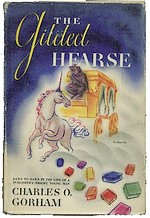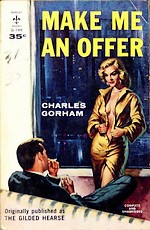 Brooks Peters, who writes one of the most consistently interesting blogs around (www.brookspeters.com), passed along a plug for Charles Gorham’s novel, The Gilded Hearse
Brooks Peters, who writes one of the most consistently interesting blogs around (www.brookspeters.com), passed along a plug for Charles Gorham’s novel, The Gilded Hearse, which sounds like a terrific guilty pleasure:
It’s not exactly unknown but seems to have been overlooked lately. Perhaps “forgotten” is a better word since I can’t imagine too many people putting it on their top ten lists. It’s a rather scathing look at the publishing business just before the early beginnings of World War Two. Set in Manhattan in 1938 (but published in 1948), it details a traumatic day in the life of a book exec named Richard Eliot who battles his own demons while depicting his circle of friends and business associates in a very unflattering light. The day is set against the backdrop of the Munich compromise which is not too subtly broadcast throughout the text whenever someone happens to turn on a radio.
The firm, Hutchinson’s, could be several well-known publishing houses of the era, complete with the white-shoe editors, the burly, brusque, hard-drinking salesmen and the neurotic, ambitious “suits” who handle the brash marketing side. None too subtle (the writing style is sort of a cross between Grace Metalious and A. J. Cronin) , it is nonetheless very revealing of past attitudes and mores, as well as a fascinating relic of a time when the publishing world was just beginning to turn corporate.
Gorham nails the ambiance of New York in the late 30s, the jazz bars, the sleazy saloons, the drunken book-signings in overly perfumed department stores, the overt anti-Semitism within polite society (in contrast to the genocide on the horizon in Germany), the sad, listless Village bohemians, and throws in a few hilariously drawn “fags” and “fairies” and one appalling lesbian stereotype to give the story some typical pulp grit and edge. One effeminate book editor named Graham Fatt, who swishes amid his Oriental art, keeps “a large jar of KY” in his purple-hued bathroom.
There’s also plenty of sex between heterosexuals, abortions, lecherous cads, adulterous wives fornicating on trains. One character admits she went “to bed” with a colleague, then corrects herself by saying “to berth.”
 The Gilded Hearse
The Gilded Hearse was also published several times as Make Me an Offer
. Time magazine’s reviewer took a great big haughty sniff when the book first came out:
As an indictment of the book business, The Gilded Hearse
is neither good burlesque nor significant exposure. Few readers will be surprised to learn that book salesmen often haven’t read the books they sell, that salesgirls in bookstores are often dumb, that book publishers are increasingly less concerned with literature than with bestsellers. Those with the kind of taste that Gorham deplores will be quickest to see that The Gilded Hearse
is just superficial enough, spiced with just enough bedroom business, to make it a likely Hutchinson book.
Brooks sums up just why what Time dismissed as trash seems like a bit of tarnished gold today:
… I thought I’d share the title with you in case any of your readers are eager to take a trip back in time to an era when the book business was a relatively insular world, dominated by a lost generation of self-hating alcoholics and men on the make. All in all, a fun, if purely nostalgic, read.
“He Lived for Money, Women, and Power” trumpets the cover of one paperback reissue of The Gilded Hearse. Toss in drinking, classism, and bigotry to boot–ah, the good ol’ days.
Brooks also recommends another Gorham novel and promises a future post on his own site about Gorham’s life and works.
Gorham also wrote the early gay-themed novel McCaffery
, about a lusty male hustler, which is equally graphic. I’m a big fan of his lurid style. It’s pulp fiction with a trenchant eye for detail and nuance, and an insider’s perspective. Gorham’s life story itself reads like one of his novels. I’ve been in touch with Gorham’s daughter Deborah, a noted scholar, about doing a piece on him for my blog, but have been wrapped up in too many things recently to give it my full attention. I hope to get it done soon.

I’m afraid it was Brooks, not me, who wrote about Charles Gorham. But you inspire me to look into his life and work a little more.
Thanks for posting this little information about Charles Gorham. I just finished reading his wonderful, ‘The Gold Of Their Bodies’ but could find no information about Gorham in the book. I was wondering if you were able to write about him in detail after speaking with his daughter Deborah.